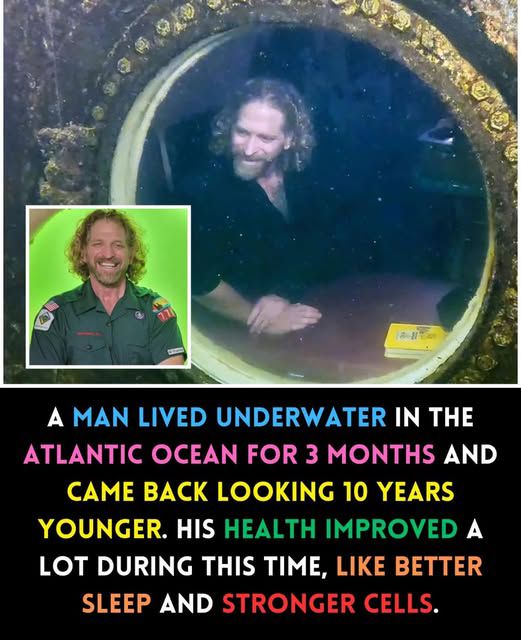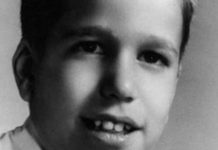The Remarkable Underwater Journey of Dr. Joseph Dituri: A Bold Exploration of Aging
In an extraordinary exploration that blends science with personal ambition, Dr. Joseph Dituri, a former U.S. Navy officer turned biomedical engineer, embarked on a pioneering journey beneath the ocean’s surface. For an astonishing 93 consecutive days, he resided in Jules’ Undersea Lodge, situated 30 feet below water in the picturesque surroundings of Key Largo, Florida. While many might think that such a venture is merely about breaking world records, Dituri aimed to delve into a fascinating question: how does hyperbaric pressure influence the human body’s biological processes? The findings from this underwater odyssey not only astound scientists but also challenge conventional notions of aging and health.
Project Neptune 100: The Quest for Knowledge
Launched as Project Neptune 100, this innovative living experiment sought to promote marine research and inspire advancements in human health. However, the outcomes of Dituri’s time underwater surpassed initial expectations and opened a new chapter in the understanding of human physiology. After emerging from his prolonged underwater stay, he underwent a series of medical tests that revealed astonishing results: his telomeres, which are protective caps at the ends of chromosomes that typically shorten with age, had increased in length by a remarkable 20%. This lengthening is significant, as it suggests a potential cellular rejuvenation, a phenomenon that could redefine how we comprehend aging.
The Science Behind Telomeres and Aging
To grasp the significance of Dr. Dituri’s findings, it’s essential to understand the role of telomeres in cellular health. Telomeres naturally shorten over time, and their degradation is often linked to aging and various diseases. In contrast, longer telomeres are associated with better health and longevity. This is particularly important given the contemporary health crisis where aging populations lead to increased healthcare costs and reduced quality of life. The fact that Dituri’s telomeres lengthened after nearly three months submerged in a pressurized environment stunned many in the scientific community. This phenomenon raises intriguing questions about the environmental factors that could potentially foster cellular health and longevity.
The Benefits of Hyperbaric Environments
Dr. Dituri’s underwater habitat maintained a pressure approximately 1.6 times greater than that of sea level, a condition that may have catalyzed the physiological changes he experienced. Living at this pressure level affects the body in myriad ways, not least of which is the enhancement of oxygen delivery to tissues. Alongside the remarkable telomere extension, he also noted a significant drop in his cholesterol levels, which decreased by an impressive 72 points. This reduction is critical, especially considering that high cholesterol is a significant risk factor for cardiovascular diseases, a leading cause of death globally.
Moreover, markers of inflammation in his body showed a decline, and he reported experiencing deeper, more restorative sleep than he had prior to his underwater adventure. These findings suggest that living in a pressurized, oxygen-rich environment could have profound effects on human health, mirroring the benefits seen in hyperbaric oxygen therapy, which is already utilized for various medical conditions including wound healing, carbon monoxide poisoning, and certain infections. As researchers look deeper into the implications of Dituri’s findings, it could revolutionize how we think about therapies for chronic illnesses.
A Personal Journey of Endurance and Hope
However, Dituri’s expedition was not solely a scientific endeavor; it was also a deeply personal mission. Having dedicated nearly three decades to the Navy and later to teaching biomedical engineering, Dituri’s fascination with the boundaries of human endurance propelled him into this unique project. For him, Project Neptune was not merely about isolation or personal achievement, but rather about the hope that scientific discovery could lead to advancements in regenerative medicine. He articulated this vision poignantly, stating, “If we can find a way to regenerate cells, fight aging, or improve brain health through pressurized environments, it could transform medicine.” This statement encapsulates a potential paradigm shift in how society views the aging process and health interventions.
Maintaining Mental Fortitude Under Pressure
Living underwater presented its own unique set of challenges. Dr. Dituri had to navigate life in cramped quarters with minimal natural light and limited human interaction for the duration of nearly three months. Yet, he managed to uphold his mental well-being through a disciplined daily routine, regular virtual communication with family and colleagues, and even engaging in physical exercise underwater. His experience serves as a compelling testament to the resilience of the human spirit against the backdrop of solitude, showcasing that mental health can be actively maintained even in challenging conditions. The psychological aspect of such an endeavor cannot be understated; loneliness can significantly affect individuals, yet Dituri’s proactive approach demonstrates how human ingenuity can adapt and thrive even in less-than-ideal situations.
The Future of Aging Research and Exploration
Now that he has resurfaced, Dr. Dituri continues to collaborate with researchers to thoroughly analyze the data collected during his underwater stay, with aspirations of publishing peer-reviewed findings that could significantly influence future therapies aimed at combating the aging process. His underwater journey may have not only rewritten the record books but also ushered in a new frontier in the realm of longevity science. The implications of his findings could reach far beyond mere curiosity; they may influence medical protocols for astronauts on long-duration space missions, as well as inform practices for underwater living and other extreme environments.
As scientists continue to explore the connections between our environments and biological processes, projects like Dituri’s may pave the way for groundbreaking advancements in health and well-being. The promise of enhanced longevity and improved quality of life through environmental manipulation opens up exciting possibilities for future research and innovations in medicine, ultimately changing how we approach health and longevity in the face of aging. With these revelations, we may be on the brink of not just extending lifespan but enhancing the healthspan—the period during which one can live healthily and actively.

















